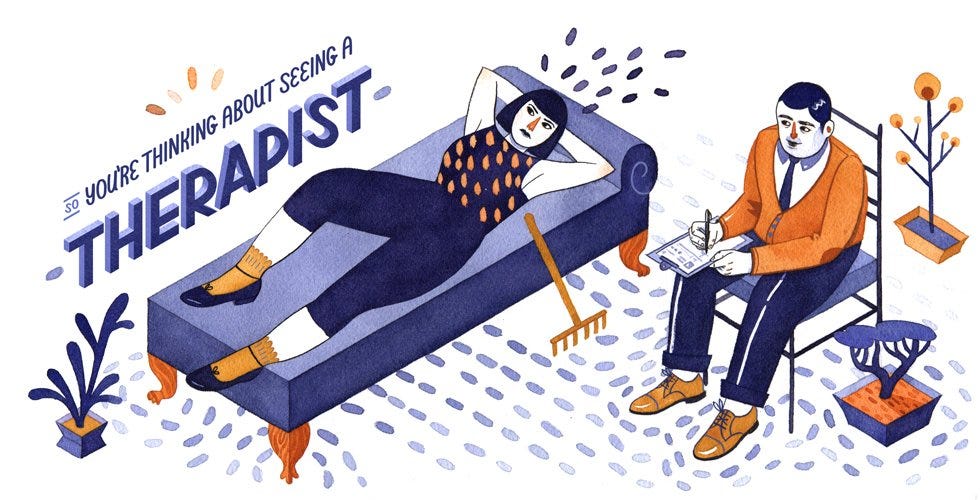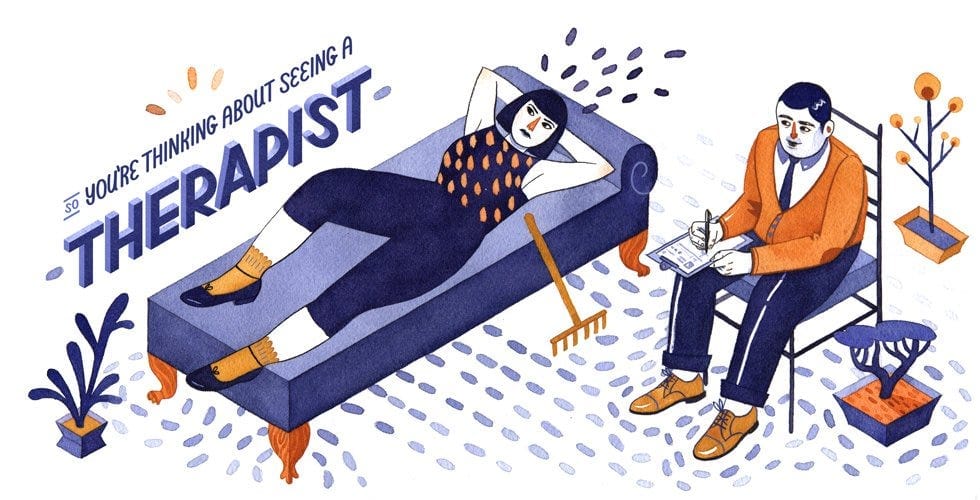
By Mark Shrayber
You can’t throw a brick in San Francisco without hitting a therapist — and if you’re throwing bricks maybe you should be seeing one? But deciding to work with one isn’t as easy. First, it’s a deeply personal choice to seek therapy, and second, there’s still a stigma about seeing a therapist, no matter the reason. Sometimes there’s a stigma about being a therapist, too. I have a master’s in clinical psychology and my mom still tells people I work in a video store. The video store, by the way, closed three years ago so everyone just thinks I’m unemployed and feels bad for me, but that’s less embarrassing than therapy for some reason. See, that’s an excellent example of what you could talk about to your therapist for 50 minutes a week. (Obviously not about my mom, that would be weird, but you get it!)

Where do I start?
The first step starts with deciding that you want to work on issues that concern you. Recognizing that you have issues can be both a relief and a daunting task, because going to therapy entails change and change is hard. (Even if you’re willing to do it! Think about all the times you’ve told yourself you’re ready to be a new person. How long does it last? For me, it’s usually an afternoon!)
It’s helpful to think about what you want to work on. What’s most important to you? For some people, therapy can be a way to alleviate symptoms, for others it may be a way to achieve personal growth, and for many it can be a way to find balance and maintain good mental health. Make a list of the issues most important to you and then use it when looking through therapists’ bios.
Speaking of bios, one of the best ways to find a therapist in private practice is to use the Psychology Today website. The practitioners listed on this site have short intros describing their way of working and areas of expertise — and you can search by all of these criteria. It’s helpful to see how practitioners describe themselves: some are no-nonsense, some are playful, and some, as is San Francisco tradition, are a little more free-spirited and touchy-feely. Here, you can also find pictures of the clinicians. While I would never recommend choosing someone based solely on their score in your hottie index, if you’re a visual person, there are headshots aplenty. (Pro-tip: To make the choice less overwhelming refine your search.)
Therapists in private practice are only one option. One of the greatest things about the San Francisco psychotherapy scene (can we call it a scene? There’s certainly a lot of psychodrama — therapy joke!) is the wealth of affordable options available to those who may find working with those in private practice cost-prohibitive. Three great options are Haight Ashbury Psychological services, the Access Institute, and the Outpatient Mental Health Clinic at CPMC.
If these don’t work for you, you can always ask for a referral to other clinics or agencies. One caveat: While the quality of treatment will be high at most non-private practice clinics, you’ll likely be matched with, rather than choose, a therapist, and the wait between making the initial call and seeing someone may be a bit longer than working with a private practice therapist.

I found a therapist I’d like to see. Now what do I do?
You call and you ask questions! Many therapists offer a consultation — either over the phone or in-person — and this will give you an actual taste of what working with this person may be like. If it seems like a fit, consider continuing, but don’t ever feel like you have to make another appointment just because you made a consultation. Shopping around is important. This is going to become a meaningful relationship for you (short or long term based on treatment option) and you want to feel relaxed and safe when discussing yourself with someone. You’ll probably be sharing information with your therapist that you wouldn’t even share with a close friend (probably about that close friend — why do they do the things they do?), so feeling comfortable is key.
If you’re wondering what kind of questions to ask, here are some to think about: Do you have any experience working with issues such as mine? How do you approach treatment? Will there be homework or skills I’ll need to practice outside of therapy? What do you think the goal of successful therapy is? Is there a time limit to treatment? What is your previous therapeutic experience? How many cats do you have and how often are we going to talk about them?
It’s important to ask therapists how they work. Even if you’re not familiar with their particular theoretical orientation, a potential therapist should be able to tell you how they communicate with clients and what you can (broadly) expect from working with them. If asking questions about their credentials is important to you, that’s cool, too, although credentials will likely have less of an impact than their personal style and how it fits your personality. For instance, someone may have three degrees from Yale but may have never heard of Gossip Girl, which is pretty much a deal breaker in any relationship. Also, by personal style I’m talking about communication but I also know a therapist who saw her clients in a tutu, so whether you’re cool with someone dressed as a ballerina hearing your life story is also going to be something to think about.

I didn’t like the therapist I talked to. Now what?
If one therapist doesn’t work out for you — their style may not have matched yours, you may have not felt heard, they talked too much or too little about their cats — it doesn’t mean another won’t work out. If you felt you connected but were vaguely uncomfortable because of the setting, that’s normal. It takes a while to build rapport with someone and you shouldn’t feel like you have to share everything all at once. A colleague once said to me, “In no other profession are you expected to meet a stranger in a closed room and reveal things about yourself you may not be comfortable with.” That’s true. Trust takes time.
Deciding whether to seek therapy is a difficult decision and it may not be the right one for everyone at all times. It can also be a growth experience that allows you new insights into your own thoughts, feelings, and behaviors. It’s up to you to decide when and if you’re ready or even want to seek someone to talk to, but in San Francisco you will certainly never want for options. (And there’s likely someone that specializes only in excessive brick throwing.)







